MoMA PS1
MoMA PS1 is one of the largest art institutions in the United States dedicated solely to contemporary art. It is located in the Long Island City neighborhood in the borough of Queens, New York City. In addition to its exhibitions, the institution organizes the Sunday Sessions performance series, the Warm Up summer music series, and the Young Architects Program with the Museum of Modern Art. MoMA PS1 has been affiliated with the Museum of Modern Art since January 2000 and, as of 2013, attracts about 200,000 visitors a year.[1]
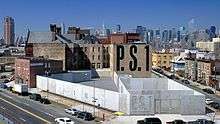 PS1 in 1994 | |

| |
| Established | 1971 |
|---|---|
| Location | New York City (Long Island City, Queens), New York City |
| Coordinates | 40.745367°N 73.947977°W |
| Type | Contemporary art |
| Visitors | Over 200,000 per year |
| Website | www |
History
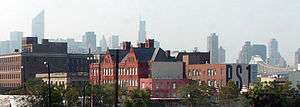
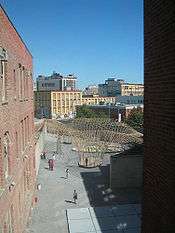

Founding
What would become MoMA PS1 was founded in 1971 by Alanna Heiss as the Institute for Art and Urban Resources Inc.,[2] an organization with the mission of turning abandoned, underutilized buildings in New York City into artist studios and exhibition spaces.
Recognizing that New York was a worldwide magnet for contemporary artists, and believing that traditional museums were not providing adequate exhibition opportunities for site-specific art, in 1971 Heiss established a formal, alternative arts organization with architecture/theater critic Brendan Gill called The Institute for Art and Urban Resources, and began renovating abandoned buildings in New York City.
In 1976, Heiss opened the P.S. 1 Contemporary Art Center in a deserted Romanesque Revival public school building, exponentially increasing the organization's exhibition and studio capacity. This building, dating from 1892, served as the first school in Long Island City until 1963, when the First Ward school it housed was closed due to low attendance and the building was turned into a warehouse.[3]
In October 1997, P.S.1 Contemporary Art Center reopened to the public after a three-year, $8.5 million renovation project designed by Los Angeles-based architecture firm Frederick Fisher & Partners.[4][5][6] The building's facilities were increased from 84,000 to 125,000 square feet in order to include a large outdoor gallery, a dramatic entryway, and a two-story project space.
In February 1999, P.S. 1 Contemporary Art Center and the Museum of Modern Art announced their institutional merger, which was stated to take 10 years and designed to preserve P.S. 1 as a center of independent experimentation and exploration.
Affiliation with the Museum of Modern Art
MoMA PS1 and the Museum of Modern Art formalized their affiliation in January 2000.[2] New York City, which owns the MoMA PS1 building, endorsed the merger.[5] The principal objective of MoMA's partnership with MoMA PS1 is to promote the enjoyment, appreciation, study, and understanding of contemporary art to a wide and growing audience. Collaborative programs of exhibitions, educational activities, and special projects allow both institutions to draw on their respective strengths and resources and to continue shaping a cultural discourse. The two institutions also integrated their development, education, marketing, financial planning and membership departments.[5] To mark the 10th anniversary of the merger between the former P.S. 1 Contemporary Art Center and MoMA, the museum changed its name to MoMA PS1 in 2010.[7]
Later development
In 2008, following the completion of a 10-year merger process with MoMA, Alana Heiss retired as director of P.S. 1 Contemporary Art Center after 36 years.[8] In 2009, Klaus Biesenbach was named Director of the renamed MoMA PS1. Biesenbach had first joined at PS1 as a curator in 1997, and subsequently held the positions of Curator in MoMA's Department of Film and Media and Chief Curator of MoMA's Department of Media and Performance Art.[8] Biesenbach left the museum for the Museum of Contemporary Art in Los Angeles in July 2018,[9] leaving the museum temporarily without a director.[10] In November 2018,[11] MoMA PS1 art handlers demonstrated outside the museum to earn the same pay as similar workers at MoMA in Manhattan,[12] and in March 2019, the museum paid a settlement with a curator who accused the museum of rescinding a job offer due to pregnancy.[13][14] In June 2019, Kate Fowle was announced as the museum's new director.[15] In November 2019, a new restaurant opened in the museum.[16]
Following a longer than initially expected closure for the coronavirus pandemic,[17][18] on April 13, 2020, MoMA PS1 told its employees there would be furloughs due to the museum facing its "most serious financial crisis" ever, with impact to be felt "for years to come," according to director Kate Fowle. 70% of the museum's workforce was furloughed, leaving 17 employees working at the museum.[19] In June 2020, the museum and the Brooklyn Museum were the only two major art institutions to participate in the Open Your Lobby initiative, which asks businesses to provide protestors with shelter or resources.[20]
Programs, installations, and events
Artist and exhibition programs
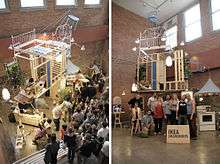
From its inception, MoMA PS1 has championed the innovative and the experimental. The premiere exhibition, Rooms, held in June 1976, featured the works of 78 artists, many of whom created site-specific installations in the former classrooms.[21] For Rooms, the sculptor Alan Saret cut a tiny hole in one wall, creating an almost heavenly aureole of light at one end of the third-floor hallway.[6] The museum has featured the works of the artists Janet Cardiff, David Hammons, Kimsooja,[22] Hilma af Klint, Donald Lipski, John McCracken, Dennis Oppenheim, Michelangelo Pistoletto, Alan Saret, Katharina Sieverding, Keith Sonnier, Michael Tracy, Franz West, Maria Lassnig, Judy Rifka, and Peter Young. Its landmark survey of Mike Kelley in 2013 was the largest exhibition of the artist's work at the time.[15] A focus has been on outsider artists such as Henry Darger, who was included in "Disasters of War: Francisco de Goya, Henry Darger, Jake and Dinos Chapman" (2000).[23] "Greater New York," a survey of emerging artists working in New York City, was established in 2000 and is mounted every five years.[24] Many exhibitions organized by MoMA PS1 travel to museums in the United States and abroad, including collaborations with Kunst-Werke Institute for Contemporary Art in Berlin.
In November 2019, the Trump administration travel ban resulted in denied visas to a number of Iraqi artists taking part in MoMA PS1's "Theater of Operations: The Gulf Wars 1991–2011" exhibitions, resulting in criticism by activists.[25]
Throughout its history, MoMA PS1 has routinely organized exhibitions outside of its building, including street performances throughout New York City, projects in the Rockaways, and international exhibitions and projects.
Important exhibitions hosted since the founding of MoMA PS1 in 1976 include:
- Rooms (June 9–26, 1976)
- Afro-American Abstraction (February 17 – April 6, 1980)
- West/East: First Generation Environmental Sculptures (September 28, 1980 - March 14, 1982)
- New York/New Wave (February 15 – April 5, 1981)
- The Knot: Arte Povera at P.S. 1 (October 6 – December 15, 1985)
- James Turrell: "Meeting" (October 26, 1986 - [ongoing])
- John McCracken: Heroic Stance, A Survey of Sculpture 1965–1986 (October 26 – December 26, 1986)
- Michelangelo Pistoletto: Division and Multiplication of the Mirror (October 2 – November 27, 1988)
- Franz West (1989)
- David Hammons: Rousing the Rubble, 1969 - 1990 (December 16, 1990 - February 10, 1991)
- Dennis Oppenheim: And the Mind Grew Fingers (December 8, 1991 - February 9, 1992)
- Jack Smith: Flaming Creature (October 29, 1997 - March 1, 1998)
- Gordon Matta-Clark: Reorganizing Structure by Drawing Through It (April 26 – August 30, 1998)
- Inside Out: New Chinese Art (1998)
- Minimalia: An Italian Vision in 20th Century Art (October 10, 1999 - January 9, 2000)
- Children of Berlin: Cultural Developments 1989 - 1999 (November 7, 1999 - January 2, 2000)
- Greater New York (February 27 – May 30, 2000)
- Disasters of War: Goya, Henry Darger, Jake and Dinos Chapman (November 19, 2000 - February 25, 2001)
- Janet Cardiff: A Survey of Works (October 14, 2001 - January 31, 2002)
- Mexico City: An Exhibition about the Exchange Rates of Bodies and Values (June 30 – September 10, 2002)
- Roth Time: A Dieter Roth Retrospective (March 12 – June 7, 2004)
- Katharina Sieverding: Close Up (October 24, 2004 - January 23, 2005)
- Peter Hujar (October 23, 2005 - April 10, 2006)
- Into Me/Out of Me (June 25 – September 25, 2006)
- Wack! Art and the Feminist Revolution (February 17 – May 12, 2008)
- Lutz Bacher My Secret Life (February 12 – September 14, 2009)
- September 11 (September 11, 2011 - January 9, 2012)
- Mike Kelley (October 13, 2013 - February 2, 2014)
- James Lee Byars: 1/2 an Autobiography (June 15 – September 7, 2014)
- Maria Lassnig (March 9 – September 7, 2014)
- Anne Imhof: DEAL (January 31 – March 9, 2015)
- Greater New York (October 11, 2015 – March 7, 2016)
- Vito Acconci: Where Are We Now (Who Are We Anyway) (June 19 – September 18, 2016)
- Mark Leckey: Containers and Their Drivers (October 23, 2016 – March 5, 2017)
- Carolee Schneemann: Kinetic Painting (October 22, 2017 – March 11, 2018)
- Bruce Nauman: Disappearing Acts (October 21, 2018 – February 25, 2019)
Young Architects Program
The Young Architects Program (YAP) is an annual competition hosted by MoMA PS1 and The Museum of Modern Art that invites young architects to submit design proposals for MoMA PS1's courtyard. The winning entry is converted from concept to construction[26] and becomes the architectural setting for MoMA PS1's summer Warm Up music series.[27] The Young Architects program was placed on a one-year hiatus in late 2019.[28]
YAP winners include:
- 1998 – untitled? by Gelatin'
- 1999 – DJ Pavilion by Philip Johnson
- 2000 – Dunescape by SHoP Architects
- 2001 – Summer Oasis by ROY (principal Lindy Roy)
- 2002 – Playa Urbana / Urban Beach by William E. Massie
- 2003 – Light-Wing by EMERGENT (principal, Tom Wiscombe)
- 2004 – Canopy by nARCHITECTS (principals, Eric Bunge and Mimi Hoang)
- 2005 – SUR by Xefirotarch (principal, Hernan Diaz Alonso)
- 2006 – BEATFUSE! by Obra Architects[29]
- 2007 – Liquid Sky by Ball-Nogues Studio[30][31][32]
- 2008 – Public Farm 1 by WorkAC (principals, Amale Andraos and Dan Wood)
- 2009 – Afterparty by MOS Architects[33] (principals, Michael Meredith and Hilary Sample[34])
- 2010 – Pole Dance by Solid-Objectives – Idenburg Liu
- 2011 – Holding Pattern by Interboro Partners & WHATAMI by stARTT (MAXXI, Rome[35])
- 2012 – Wendy by HWKN (principals, Matthias Hollwich and Marc Kushner[36])
- 2013 – Party Wall by CODA (principal, Caroline O'Donnell[37])
- 2014 – Hy-Fi by The Living (principal, David Benjamin[38])
- 2015 – COSMO by Andrés Jaque
- 2016 – Weaving the Courtyard by Escobedo Soliz Studio
- 2017 – Lumen by Jenny Sabin Studio
- 2018 – Hide & Seek by Dream the Combine
Warm Up
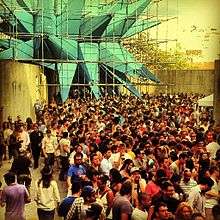
Warm Up is MoMA PS1's music series summer event. The series is housed within the architectural installation created by the winner of the annual Young Architects Program. Together, the music, architecture and exhibition program provide a unique multi-sensory experience for music fans, artists, and families alike.[39]
Warm Up was conceived in 1997 as a summer-long dance party to bring new audiences to MoMA PS1 and Long Island City, Queens. The series runs every Saturday from July through early September and draws thousands of local and international visitors each day.
Highlights from the series include a notable group of international DJs and live music ensembles: DJ Harvey, Groove Collective, Afrika Bambaataa, Mad Professor, Richie Hawtin, François K, Fischerspooner, Kid Koala, Arto Lindsay, Scissor Sisters, Luke Vibert, Solange, Jamie XX, Grimes, Arca, Black Dice, Four Tet, DJ Premier, Ritchie Hawtin, Derrick May, Venus X, Cardi B, Lizzo, and many more.
Long-term installations
MoMA PS1 houses several long-term installations throughout the building:[40]
- A large outdoor dome used for house exhibitions, as of 2013[41]
- Richard Artschwager, Blips, 1976. Location: Throughout MoMA PS1
- Richard Artschwager, Exit - Don't fight City Hall, 1976. Location: First floor
- Richard Serra, Untitled, 1976. Location: Rooftop
- Alan Saret, Hole at PS1: Fifth Solar Chtonich Wall Temple, 1976. Location: Third floor, eastern end of north wing
- Lawrence Weiner, A bit of matter and a little bit more, 1976. Location: Front door, stenciled on glass
- James Turrell, Meeting, 1986. Location: Third floor
- Pipilotti Rist, Selbstlos im Lavabad (Selfless in the Bath of Lava), 1994. Location: Lobby, single-channel video installation
- Matt Mullican, Untitled, 1997. Location: Steel inset in basement floor
- Cecily Brown, Untitled, 1997. Location: Staircase B
- Alexis Rockman, Untitled, 1997. Location: Staircase B
- Sol LeWitt, Crayola Square, 1999. Location: Basement floor
- William Kentridge, Stair Procession, 2000. Location: Staircase B
- Ernesto Caivano, In the Woods. 2004, Location: Staircase A
- Abigail Lazkoz, Cameraman, 2005. Location: Staircase B
- Saul Melman, Central Governor, 2010. Location: Basement Boiler Room[42]
- James Ferraro, Saint Prius, 2014. Location: Throughout MoMA PS1 (and available to download from the museum website)
Management
Under chairwoman Agnes Gund, in 2010 the MoMA PS1's board of directors included the artists Cindy Sherman and Mickalene Thomas, art historian Diana Widmaier-Picasso, fashion designer Adam Kimmel, and art collectors Adrian Cheng and Peter Norton.[43] In 2020, an open letter by artists asked the museum to remove Larry Fink and Leon Black from the MoMA PS1 board for their investment history.[44] MoMA PS1 "receives about eight percent of its operating budget from the city" in 2019.[45] As owner of the MoMA PS1 building, New York City contributes to MoMA PS1's annual operating budget. Exhibitions at MoMA PS1 are funded by the Annual Exhibition Fund, which draws donations from trustees.
References
- "Facelift for Queens Museum". Daily News. New York. Retrieved May 3, 2017.
- "Profile". MoMA PS1. Retrieved July 17, 2018.
MoMA PS1 was founded in 1971 by Alanna Heiss as the Institute for Art and Urban Resources Inc.
- "Long Island City". New York. August 11, 1980. p. 24. Retrieved January 1, 2013 – via Google Books.
- Louie, Elaine (October 2, 1997). "CURRENTS; THE NEW P.S. 1: CONTEMPORARY ART, BUT THE BUILDING'S THE STAR". The New York Times. Retrieved July 17, 2018.
- Carol Vogel (February 2, 1999), A Museum Merger: The Modern Meets The Ultramodern The New York Times.
- Roberta Smith (October 31, 1997), Art Review: More Spacious and Gracious, Yet Still Funky at Heart The New York Times.
- Carol Vogel (April 29, 2010), Tweaking a Name in Long Island City The New York Times.
- "Museum of Modern Art | MoMA". The Museum of Modern Art. Retrieved May 3, 2017.
- "MoMA PS1's Klaus Biesenbach, a Champion of the Avant-Garde and Celebrities Alike, Will Now Lead MOCA LA". artnet news. July 31, 2018. Retrieved September 11, 2018.
- Passy, Charles (August 1, 2018), "Longtime Director's Exit Leaves Big Void at MoMA PS1 in Queens", The Wall Street Journal, retrieved June 26, 2020
- Greenberger, Alex (November 18, 2018), "'Management Should Be Ashamed': MoMA PS1 Installers and Maintenance Workers' Union Protests Pay Rates", ARTnews, retrieved June 26, 2020
- Moynihan, Colin (December 6, 2018), "Art Handlers at MoMA PS1 Demand Same Pay as Manhattan Colleagues", The New York Times, retrieved June 26, 2020
- Ryzik, Melena (March 26, 2019), "MoMA PS1 Settles With Curator Who Said Giving Birth Cost Her Job Offer", The New York Times, retrieved June 26, 2020
- Cascone, Sarah (March 27, 2019), MoMA PS1 Settles With Curator Who Accused the Museum of Pregnancy Discrimination, Artnet, retrieved June 25, 2020
- Robin Pogrebin (June 26, 2019), MoMA PS1 Looks to Moscow to Hire New Director The New York Times.
- Orlow, Emma (November 13, 2019), "Mina's, opening at MoMA PS1, joins New York's museum café evolution", Time Out, retrieved June 26, 2020
- Kaufman, Maya (March 13, 2020), MoMA PS1 Temporarily Closes, Citing Coronavirus Regulations, Patch.com, retrieved June 25, 2020
- Hilburg, Jonathan (March 13, 2020), "Met, MoMA, and more go dark over coronavirus concerns", The Architect's Newspaper, retrieved June 26, 2020
- Greenberger, Alex (April 21, 2020), "Facing Its 'Most Serious Financial Crisis' Ever, MoMA PS1 Furloughs More Than 70 Percent of Workers", ARTnews, retrieved April 21, 2020
- Holmes, Helen (June 16, 2020), "NYC Performance Spaces Have Stepped Up to Help Protesters, and Museums Should Too", Observer, retrieved June 25, 2020
- Rooms P.S. 1, June 9–26 (New York: The Institute for Art and Urban Resources Inc., 1977), 3.
- "im Sooja: A Needle Woman July 1–September 16, 2001". MoMA PS1.
- Carol Vogel (May 31, 2012), MoMA Acquires More Dargers The New York Times.
- Roberta Smith (May 27, 2010), Take Me Out to the Big Show in Queens The New York Times.
- Greenberger, Alex (November 8, 2019), "Arts Organization Decries Denial of Visas to Iraqi Artists in MoMA PS1 Show: 'It Is Unacceptable'", ARTnews, retrieved June 26, 2020
- "Young Architects Program (YAP)". MoMA. Retrieved July 17, 2018.
- "Young Architects Program 1999". MoMA. Retrieved July 17, 2018.
- Baldwin, Eric (2019), MoMA PS1's Young Architects Program Placed on Hiatus, ArchDaily, retrieved June 26, 2020
- "Events". Obra. Retrieved July 17, 2018.
- "Liquid Sky at MoMA PS1 Ball-Nogues Studio". Architect. February 7, 2014. Retrieved July 17, 2018.
- "A New Sky for P.S. 1" (PDF). The Architects Newspaper. March 30, 2007. Retrieved July 17, 2018.
- "Liquid Sky, 2007". Sheila Pepe. Retrieved July 17, 2018.
- "Pavilion, No. 4, MoMA PS1, Afterparty". MOS Architects. Retrieved July 17, 2018.
- Basulto, David (July 28, 2009). "Afterparty, P.S.1 2009 Installation / MOS Architects". ArchDaily. Retrieved July 17, 2018.
- "Holding Pattern". Interboro.
- "Wendy". HOLLWICH KUSHNER ARCHITECTURE DPC. Retrieved July 17, 2018.
- "Party Wall". CODA. Retrieved July 17, 2018.
- "Embodied Computation Lab". The Living. Retrieved July 17, 2018.
- Corsini, Rachel (July 9, 2010). "MoMA PS1 Warms Up Summer in a Cool Way". Brooklyn Downtown Star. Retrieved November 23, 2014.
PS1's Warm Up parties aren't just parties, however; they are an "experimental exhibition at the museum," said Cindy Hinant, a volunteer coordinator. Not that it isn't a blast, with beer available to those of legal drinking age. You won't find Budweiser here, though. They serve Original Sin Hard Cider and Magic Hat #9, a welcome change from the norm that speaks to the theme of serving the indie community.
- "MoMA PS1 Long-Term Installations | MoMA". The Museum of Modern Art. Retrieved May 3, 2017.
- "MoMA PS1 director renews Rockaways cleanup", Crain's New York Business, March 15, 2013, retrieved June 25, 2020
- seamlesswhole.com. "Saul Melman | Gallery". www.saulmelman.com. Retrieved May 3, 2017.
- Leon Neyfakh (February 24, 2010), New Blood for P.S.1's Board of Directors The New York Observer.
- Small, Zachary (January 14, 2020), "In Open Letter, Artists Urge MoMA, PS1 to Divest from Board Members Who Support 'Suffering of Others'", ARTnews, retrieved June 25, 2020
- Dafoe, Taylor (August 6, 2019), New York City Told Its Museums to Diversify or Lose Funding. Here’s How They Plan to Address the Problem, Artnet, retrieved June 26, 2020
External links
| Wikimedia Commons has media related to MoMA PS1. |